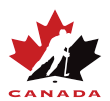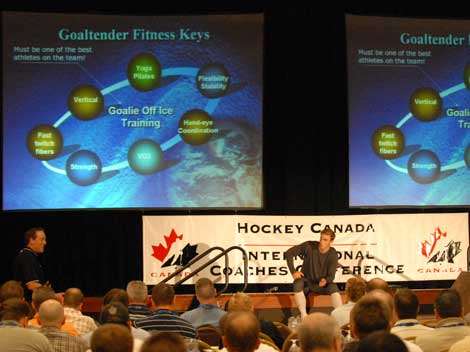LTPD Stages of Development for Hockey Players
Sport Canada's Long-Term Athlete Development model guides hockey players from discovery the game to maximizing their potential
Hockey for Life, Hockey for Excellence
Sport Canada’s Long-Term Player Development (LTPD) Resource Paper “Canadian Sport for Life” sets out a framework for sport development of Canadian athletes. Hockey Canada’s Long-Term Player Development (LTPD) is a nine-stage model based on the physical, mental, emotional and cognitive development of children and adolescents. Each stage reflects a different point in developing the player. The first four stages emphasize physical literacy and a broad range of sport experiences. The next five stages focus on development and competitive excellence.
Active for Life
Athletes aged 0-12 are encouraged to developer broad physical literacy across a range of sports and activities.
Athletes aged 12 and above may increase hockey specific training to suit individual goals and level of competition.
Active for Life encourages life-long physical activity and informed healthy lifestyle choices with participation in hockey long after the competitive years.
Discover
Community
Male and Female | Ages 0 - 4
This is an important period for acquiring fundamental movement skills (running, gliding, jumping, kicking, catching...) that lay the foundation for more complex movements, thereby preparing children for a physically active lifestyle. Hockey Canada encourages children to begin skating at an early age through Discovery Hockey programs.
Fundamentals 1
Community / Local
Male and Female | Ages 5-6
The focus is on the development of physical literacy. Fundamental movement skills should be mastered and motor development emphasized, and participation in many sports/activities is encouraged. For optimal skill acquisition, the basic hockey skills of skating and puck control are introduced through the Initiation Program. FUN competitions are also introduced in a team environment.
Fundamentals 2
Local
Male and Female | Ages 7-8
During this period players continue to develop motor skills and coordination. Practices sessions should be held twice a week during the season. Ongoing participation in compatible sports is strongly encouraged. The Novice Skills Program is designed to promote the continued development of physical literacy, fitness, and the basic skills required to play hockey.
Learn to Play
Local
Male 9-10 | Female 8-9
This stage is the beginning of the most important window to develop the fine motor skills on an individual technical skill basis that leads to utilizing these skills into individual and team tactics later on. During this phase, prior to the beginning of the growth spurt, players have the best opportunity to learn and begin to master fine motor skills that can be used in combination with other skills. In most cases what is learned or not learned in this stage will have a very significant effect on the level of play that is achieved later on. Players should be able to begin to transfer skills and concepts from practices to games.
Learn to Train
Local / Provincial
Male 11-12 | Female 10-11
This is the most significant period for development. This is the window of accelerated adaptation to motor coordination. Group interaction, team building and social activities should be emphasized. A reasonable balance of practices and games will foster the ongoing development and mastery of essential skills in hockey.
Train to Train
Provincial
Male 12-16 | Female 11-15
The focus during this stage is on building an aerobic base, developing speed and strength and further developing and consolidating sport specific technical skills with an increased emphasis on hockey and a reduction in the number of other sports played. This phase will also include the introduction and development of individual and group tactics. Social and emotional considerations are addressed by placing an emphasis on team-building, group interaction and social activities.
Train to Compete
National
Male 16-17 | Female 16-18
During this stage players will participate in training with a focus on position specific technical and tactical preparation. There is as emphasis on fitness preparation and the development of position specific technical and tactical skills under competitive conditions. Important objectives are the development of aerobic capacity, power, self awareness and independence. The player may be introduced to international competitive experience at the end of this stage.
Train to Win
International
Male 18-20 | Female 18-22
During this stage the player’s physical, technical, tactical (including decision- making skills), mental, personal and lifestyle capacities are fully established and the emphasis in training has shifted to the maximization of performance. High performance sport specialist support is optimized, as is fitness and medical monitoring. Modeling all possible aspects of training and performance.
Excel
International
Male 21+ | Female 22+
It is at this stage that all systems, including physical preparation, testing or monitoring and others which are supportive in nature, are fully maximized and refined to ensure excellence at the highest competitive levels (i.e., the Olympic Games and World Championships).Players continue to enjoy competition and training at the highest level with a focus on maintaining or improving technical, tactical, physical, and ancillary capacities.


 HOCKEY CANADA
HOCKEY CANADA


